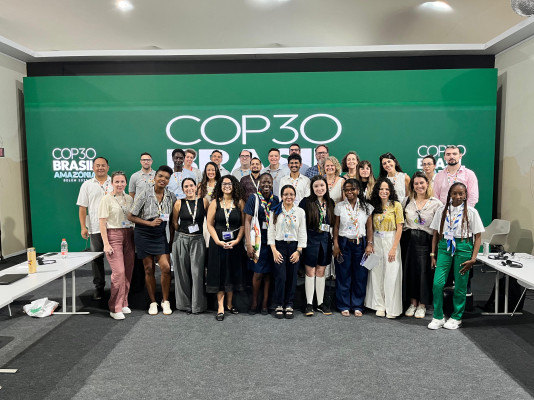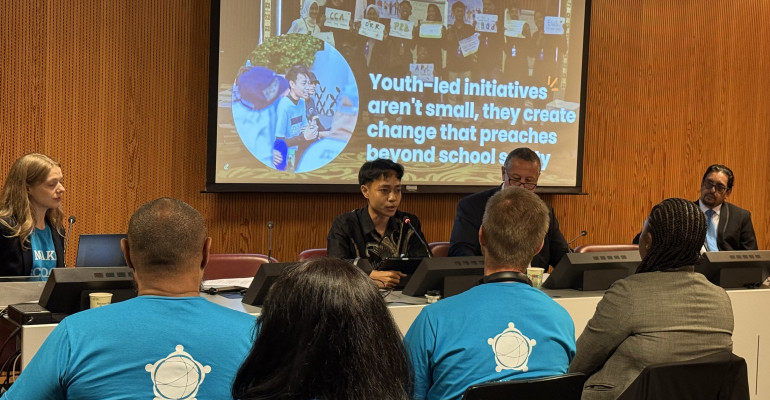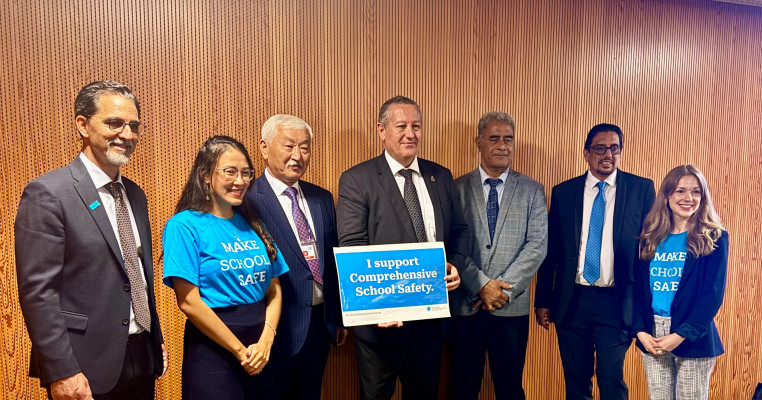Six reflections from the Transforming Education Summit stocktake
Save the Children
Jun 27, 2024 · 6 min read
By Anja Nielsen, Senior Education Policy & Advocacy Adviser, Save the Children UK, and GADRRRES Advocacy Working Group Co-Lead
From climate change to conflict to underfunding (and more), the list of challenges facing education around the world is extensive. It is essential that the global education community responds with an approach that is as comprehensive, as ambitious, and as steadfast as the challenges we face, if we are to realise every child’s right to learn.
This was the backdrop for the UN Transforming Education Summit (TES) in September 2022, and remains the picture today. Last week, the global education community gathered together in Paris for a stocktake of what progress has been made since the TES - here are six reflections:
The headline: Money, money, money, money.
Education financing was perhaps the single most important topic of the stocktake. The phrase ‘education is an investment, not a cost’ was spoken in nearly every panel, echoing time and again across speakers.
In a plenary session chaired by Mamta Murthi, Vice President for Human Development at the World Bank, a range of practical solutions were highlighted, including increasing domestic spending, innovative financing, and debt swaps. Most encouragingly, European Commissioner for International Partnerships Jutta Urpilainen suggested the creation of a Coalition of Finance Ministers for Education – a development that we hope will see high-level commitment turned into tangible investment.
And with the cost of inaction on Sustainable Development Goal 4 (SDG4) now estimated to be as high as $10 trillion annually – highlighted in a report launched at the stocktake – these ideas are both necessary and urgent.
The reassurance: The TES is still relevant.
The turnout at the stocktake – which took place on an official UN holiday – demonstrates the continuing momentum behind the TES follow-up and processes. Ministries of Education from around the world were represented, as well as a range of international and civil society organisations, teaching unions, youth organisations, and more. Special guests included Ms. Amina Mohammed, Deputy Secretary-General of the United Nations and H.E. Mr Gabriel Boric Font, President of the Republic of Chile. Ms Chrysoula Zacharopoulou, Minister of State for Development, Francophonie and International Partnerships from France, even used this opportunity to launch her government’s new international strategy on basic education.
A new country commitment dashboard launched by UNESCO at the event also highlighted progress made by governments since the TES. The ample, if topline, actions set out in the dashboard show the strong commitment to follow-up that continues to drive the TES outcomes.
The standout: Teachers are in the spotlight.
A powerful speech by Ms Michelle Codrington-Rogers, Teacher and President of the NASUWT union (UK) in the second session set the tone for the day, reminding us that teachers are ‘the bridge, the hope’ that we need to deliver on the promise of SDG4. Teachers are central to translating the TES commitments into action.
But teachers need more than celebration and support. They need qualifications, better working conditions, and fair pay. Only with these actions will we unlock the full potential of educators – and with them, the children we all work for.
It was a shame, however, not to see any teacher speaking on behalf of their profession in the panel on teachers, and there was a lack of attention overall on the additional support needed for teachers in crisis contexts and refugee teachers.
The big omission: Resilience and preparedness for future crises.
Despite references to COVID-19 recovery, increasing and deepening crises around the world, and the impacts of the climate emergency, very little was said about preparing education systems for the crises we know are coming. But we know that so much of the progress that has been committed to, the funding invested, and the decisions made will be challenging (if not impossible) to deliver, if disaster risk reduction is not made a priority.
This gives us a call to action, highlighting the urgent need for more advocacy on solutions such as the Comprehensive School Safety Framework (CSSF). While over 70 countries have endorsed this Framework, more countries must adopt, implement, and champion these types of approaches to reduce the impact of present and future crises on children, educators, schools, and communities.
The need for scale-up: Inclusion.
References throughout the day were made to the importance of inclusion in education, including a dedicated session on gender equality and girls’ and women’s empowerment and the topic a key part of a new report on Early Childhood Care and Education launched at the event. But more work is needed to ensure all learners, particularly children with disabilities (who were largely absent from the conversation), are recognised and prioritised in any and all action on SDG4.
The urgent task: More work on children’s voices.
While the youth moderator of the session, SDG4 Youth & Student Network member Ms Christina Williams, provided an impressive framing for the day, hers was one of the few youth voices in the room. Moreover, not a single child was present, with their voices entirely absent from discussions. In the words of Sahana Kaur, GEP Advisory Group youth representative, ‘Young people end up having to work outside the system to create avenues [for greening education]...it's not fair to expect children and youth to do it all by themselves.’
Save the Children has consistently called for the inclusion of children’s voices in the TES and other global education processes. We reiterate this call, particularly as we look towards the next moments on the global education calendar.
Where do we go from here?
Key moments throughout 2024 offer a series of stepping stones to accelerate action, highlight progress, and communicate priorities within and beyond the global education community. The most important next step for the TES and its processes is the Global Education Meeting in Brazil later this year, happening alongside the G20 Education Minister’s Meeting. This gives us another key moment to raise the need for urgent action on resilience, inclusion, and child voices, alongside existing SDG4 priorities.
But education doesn’t happen in one moment, and neither will our calls for action. We must use every moment we can to raise children’s demand for action on education – and achieve sustainable, resilient progress towards SDG4.
This blog was originally posted on the Save the Children UK website on 27 June 2024.
Photo credit: © Luis Romero/ Save the Children




